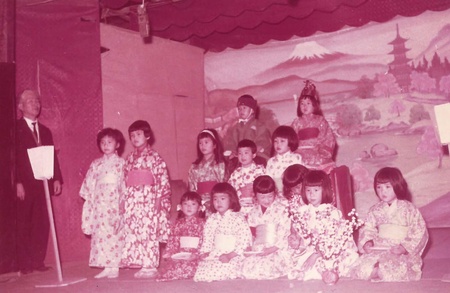The memories that bubble up in my memory, the best, are those from my childhood. My first participation in a theater play at the age of 5, representing the Emperor of Japan, sitting next to my Empress, at Nihongakô. I never forgot. It seemed like he was born for this. To be Emperor. Those were different times.
At that age, I went to Japanese school alone, by bus. The driver and the conductor knew me. And they left me at the school door. I have always been very independent since I was very little, perhaps influenced by the hard life my parents had farming in the places where they spent their childhoods, after arriving in Brazil as immigrants. They always had to work hard to have food on the table. And this was the first inheritance that my Parents left for us, their 3 children. The hard work to deserve to have a full table. But I don't remember experiencing difficulties.
My Father was a very intelligent, popular and respected man. I also remember his exquisitely written handwriting in impeccable Portuguese, in love letters to my Mother and certainly trained in calligraphy notebooks, so popular at that time. I was always absolutely sure that he truly loved my mother. That's funny for a legitimate “Issei from Osaka”. Because at that time, miais were common – an ancient Japanese custom where parents choose who their children will marry. But the truth is that, from the stories I heard, my Father won my Mother's heart. There was no miai .
My Father was really a different Japanese. I loved sitting in the backyard eating oysters seasoned with salt and lemon, with my younger brother and me. Or do Sukiyaki. At the time, I didn't know why I liked the Sukiyakis he made so much. Today I know why. That feeling of everyone gathered around the table, eating together. Our family, uncles, cousins , Obachan. The joy of being together. Now it's just a feeling of longing.
He was also Judo Sensei , but that old Judo, from pre-war times. Judo is beautiful to see.
He spoke, read and wrote Portuguese with ease. And when I turned 7, he told me that he would no longer speak Japanese to me, because I was Brazilian, I had been born in Brazil and I should learn to speak, read and write in correct Portuguese. This fact would completely change the rest of my life. I ended up completely forgetting the Japanese language. I forgot writing, reading and speaking. I became a completely Brazilian descendant.
I think that's also why I never managed to date a Japanese descendant and I ended up only having gaijin friends. Very few Nikkei friends. My best friend from elementary school (it used to be called primary and junior high) was a black boy, Miltom, who was the smartest boy in school. And he was also the boy who dated the most beautiful girl in school! That was incredible almost 50 years ago!!!
My father was also not a flower to smell very well when it came to fights. I remember one time, in Nihongakô, when I was beaten by three boys from school. I arrived home crying. His reaction was immediate: Tomorrow, you pick them up one by one, without mercy!
I had no doubts. The next day, following my Father's order, I took a stick and cracked one of the boys' heads open. I drew blood. I went after the others, but they ran away. My Sensei caught me before. And he immediately took me home.
When I got there, I wanted to talk to my father, to complain about what I had done to the boy. My Father said: Yesterday, when my son was beaten by the three boys, Sensei didn't come to my house to apologize for what happened. Why are you coming to complain today? I was the one who ordered him to fight back today! If he did, he did my bidding and I'm proud of him! He won't pick a fight with anyone, but he won't be beaten at his school anymore either, because they will respect him! Those were different times! Sensei apologized and left.
It was a time of honor and moral ethics. A time when agreements were made on a mustache, as they used to say. Houses were sold with notebook receipts. I really miss that time. And I miss my Father much more, the true Emperor of the Kingdom of my childhood.
© 2016 Mitsuo Luiz Kariya




